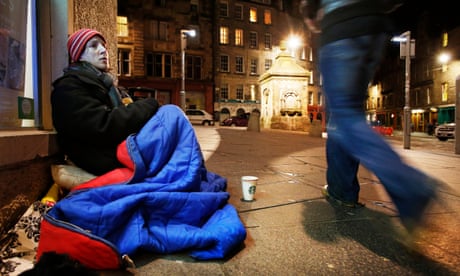There are many reasons why I became homeless, but no one was surprised it happened. I’m just another care leaver who lost control of their life. Almost every person I lived with in children’s homes and foster placements has since experienced mental health problems, stints in prison, and battles with drug and alcohol addiction. What would make me so special that I could avoid the inevitable breakdown?

Homeless in Britain: ‘I graduated with honours – and ended up on the streets’
I spent periods in a tent on a campsite near Saddleworth Moor, where I was woken up every night by my neighbour, a cantankerous Yorkshireman who would liberate the grievances he had been bottling up all day in a series of piercing screams.
The local housing advice service was no help. I was told that to be considered a priority need, I had to demonstrate that I was more vulnerable than my homeless counterparts. As one adviser put it: “I have to establish that you would be worse off than me, if I were homeless.” It may interest people that local councils are now running a misery contest for housing, a sort of X Factor for the destitute. Maybe my audition would have gone better if I’d had a few more missing teeth, and wet myself while singing Oom-Pah-Pah.
And then I befriended a resident of a residential charity for the homeless. He was far more helpful than the housing advisers, and managed to organise a place for me at the charity.
When I entered its walls, which were inside a converted factory, the place immediately struck me as having similarities with a Victorian workhouse. I was told by the “community leader” that I would receive basic subsistence: a room, food, clothing and a modest weekly allowance, in exchange for 40 hours’ labour.
The word “workhouse” conjures up images of Oliver Twist, and of bleak Victorian institutions populated by bedraggled paupers forced into backbreaking labour in exchange for meagre slops of porridge. At the charity home we were not expected to pick oakum or break boulders, but the work was hard and the returns were meagre.
Part of my job involved delivering furniture. I spent day after day lifting heavy items such as wardrobes and three-piece suites, sometimes up and down several flights of stairs. The work is described as voluntary by the charity, but in reality neither I nor any of my fellow inmates had anywhere else to go, and so had little choice but to do it.
The charity describes itself as a “working community”. But as far as I was concerned this was a workhouse in all but name: a civil prison, and a punishment for poverty. How do such charities manage to require their residents to work up to 40 hours a week without a wage, paying them only a small allowance for food and accommodation?
In 1999 the New Labour government exempted charities and other institutions from paying workers the national minimum wage if prior to entering a work scheme they were homeless or residing in a homeless hostel. There is perhaps no better demonstration that this country is yet to shake off punitive Victorian attitudes towards the “undeserving” poor.
These regulations not only strip homeless people of the right to a decent wage, but of all their other employment rights too. Because residents of such charities are not classed as employees, they cannot claim unfair dismissal or sick pay. Many people have lived and worked at the charity for up to 15 years, yet they can be sacked and evicted with no legal right to appeal.
I accept that residents, some of whom have suffered with long-term alcoholism and drug dependency, are far better off within the charity home’s walls than they would be on the streets or living alone. The environment is predominantly a positive one, where residents are well fed and safe, and are overseen by conscientious staff. The charity does give individuals the chance to participate in meaningful work and contribute to a community, sometimes for the first time in their lives. But none of this alters the fact that residents are forced by poverty to work for no pay.
The homelessness reduction bill, which last week passed its final obstacle in parliament, provides an opportunity to change our approach. It will force local authorities to provide assistance to people threatened with becoming homeless 56 days before they lose their home, ending the misery contest I and others have been subjected to over the years.
This bill represents a very small step in the right direction, but much more needs to be done to address the reasons people find themselves on the streets in the first place. And ending the exploitation of homeless people for their labour should be one of the first goals.
It is ironic that a Labour government created a backdoor for the revival of workhouses when it was Attlee’s government that abolished the workhouse system. The idea that the poor should be forced to work for board and basic subsistence was once universally condemned, but it has been revived without a murmur of public disapproval.
No one else in our society can be mandated to work full time for no pay, with no rights, on pain of being condemned to a life on the streets. So why is it OK to treat homeless people this way?
No comments:
Post a Comment